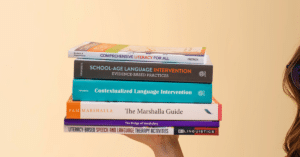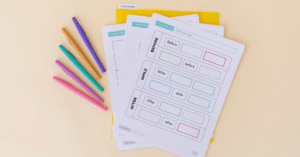This is a guest blog post by Monica, a school-based SLP, all about how to build relationships with students while taking into consideration anxiety and other mental health needs!
When our students have anxiety or other mental health needs, we can collaborate with the school psychologist or counselor on goals. We can ask them about how to best support our students.
Another option is to work with the classroom teacher! The SLP is often the best person to collaborate with the classroom teacher if the student doesn’t have academic support services. Being able to suggest accommodations in the classroom could improve a student’s quality of life at school.
Examples of Accommodations
– To be able to present alone and not in front of the class for a student that stutters.
– To be able to ask a teacher to explain directions on a test if they are unclear without fear of being told no.
– To have a discrete signal with the teacher to communicate that they need help.
– To be referred to a peer mentor for classes they are struggling with.
– To have graphic organizers to help them plan assignments.
Push-In Lesson Ideas
– Talk about different styles of communication with neurotypical and neurodivergent students, also known as the double empathy problem (Mitchell et al., 2021).
– Talk about recognizing feelings and dysregulation in your body and have students try out different coping mechanisms to see what works for them.
– Talk about different ways to self-advocate when you are not feeling regulated. (Working in the classroom is also a great way to model for teachers and collaborate without adding it to your workload.)
My favorite Instagram account for school counseling resources and information is WholeHearted School Counseling.
View this post on Instagram
Rachel Dorsey is an autistic SLP that is also one of my favorite accounts. She has a lot of amazing posts on working with autistic clients. I love this post on not labeling autistic student’s emotions:
View this post on Instagram
References
Mitchell, P., Sheppard, E., & Cassidy, S. (2021). Autism and the double empathy problem: Implications for development and mental health. British Journal of Developmental Psychology, 39(1), 1–18.




Reader Interactions